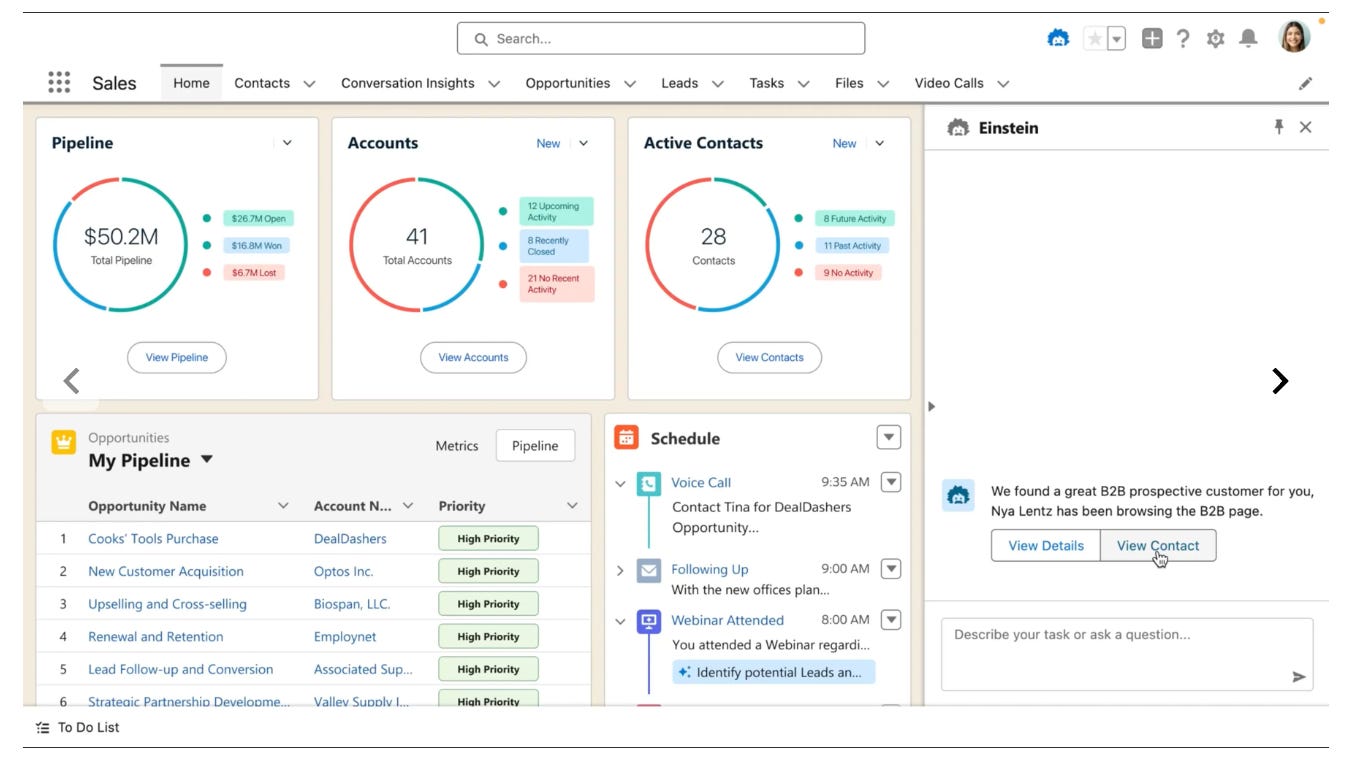Salesforce's Einstein Copilot is Positioned as a Conversational AI Assistant for CRM
A collection of specialty assistants instead of simple feature augmentation
Salesforce today debuted its new Einstein Copilot, Studio, and Trust Layer for data at its annual Dreamforce user conference. There are a number of generative AI powered “copilots” popping up that enable natural language inputs and conversational interactions. With Einstein, Salesforce seems to be going a bit further.
Instead of merely responding to a user request, the Einstein Copilot is designed to surface information proactively and suggest actions. It also enables conversational inputs and appears to work across customer lifecycle stages based on your customer relationship management (CRM) data residing in Salesforce. Today’s announcement summarized the news:
Einstein Copilot: A new and trusted out-of-the-box conversational AI assistant built into the user experience of every Salesforce application. Einstein Copilot will drive productivity by assisting users within their flow of work, enabling them to ask questions in natural language, and receive relevant and trustworthy answers that are grounded in secure proprietary company data from Salesforce Data Cloud. In addition, Einstein Copilot proactively offers options for additional actions beyond the user’s query – such as a recommended action plan after a sales call, or creating a new service knowledge article.
Einstein Copilot Studio: An easy new way for companies to build an entirely new generation of AI-powered apps with custom prompts, skills, and AI models to close sales deals faster, streamline customer service, auto-create websites based on personalized browsing history, or turn natural language prompts into code, as well as hundreds of other business tasks. Einstein Copilot Studio also provides configurability to make Einstein Copilot available for use across other consumer-facing channels like websites to power real-time chat, Slack, WhatsApp, or SMS.
Coming in pilot this fall, Einstein Copilot and Einstein Copilot Studio will operate within the Einstein Trust Layer, a secure AI architecture natively built into Salesforce that allows teams to generate higher-quality AI results by grounding responses with customer data, while preserving their company’s data privacy and security standards.
Role-Based Copilots
Salesforce indicated that there are several new copilot offerings that are specialized for different job functions.
Sales - facilitating research and tasks, throughout the sales cycle
Service - enabling self-service and contact center support for issue resolution
Marketing - creating content, campaigns, and personalization.
Commerce - optimizing offers, product catalogs, and conversion strategies
Developers - generating code to improve your Salesforce solution
Tableau - creating a natural language interface for data analysis
There are also several industry-focused assistants, including:
Financial advisor
Healthcare administrator
Automotive service provider
College administrator
I recommend you take a look at how Salesforce is orienting its Einstein offerings. It is hard to say whether the solutions will work as advertised or if they will truly be operational and useful out-of-the-box. However, Salesforce’s decision to segment the assistants by function and further by functional roles within an industry is worth noting.
The advantages of this approach may help user adoption and technical performance. Adoption should be swifter because the solution can focus on the needs of a specific user persona and tailor the features to a specific set of needs. The accuracy of the proactive recommendations and responses should also be higher because the model has a narrower set of data and processes to consider in supporting a user.
A potential downside is that the narrowness of the context may limit use and make the copilot service as more of a notification and search tool than a true copilot. This is where Salesforce must ensure both the breadth and depth of the copilot capabilities.
Create Your Own Einstein
Salesforce also elaborated on how enterprises can customize their Einstein Copilots.
Companies that want to customize Einstein Copilot will use the new Einstein Copilot Studio to build and tailor AI assistants with relevant prompts, skills, and AI models to accomplish specific sales, service, marketing, commerce, and IT tasks.
It seems like nearly every enterprise software provider now offers some features enabled by generative AI. These are typically functional capabilities such as text generation, image generation, summarization, or enhanced search. The approach is augmentation as opposed to transformation of the user experience.
Few companies are creating role-based conversational assistants, tailored to a specific set of business processes. ChatGPT Enterprise has this on the roadmap. Microsoft 365 Copilot and Google Duet AI both focus on grounding their copilots on company data, but like other software providers, the manifestation reveals an application-first feature orientation.
Even fewer companies are currently promising the ability to create custom copilots with unique features. Azure OpenAI Services enables this, but that is outside of an application environment. Salesforce has expressed a very specific vision, and it is not about one assistant, but rather a collection of specialty assistants tuned to specific goals.
Talking About Trust
Of course, Salesforce grounds all of this conversation around “trust” and data. The trust layer is the data layer with a name intended to overcome enterprise fears about generative AI becoming a new source of data leakage. Setting trust aside, the functional idea here is integrating enterprise data with generative AI processing to enable new capabilities.
Let me know what you think about the Einstein strategy and your impressions if you have a chance to use it. The vision is well-crafted, practical, and bold. I will be intrigued to see if the execution matches the precision of the marketing.
ChatGPT Enterprise - 7 Things to Know About OpenAI's Latest Product
OpenAI today announced ChatGPT Enterprise, promising enterprise-grade security and privacy along with new features. The company revealed the original ChatGPT is widely used in large companies today, and some are already using the new product. Since ChatGPT's launch just nine months ago, we’ve seen teams adopt it in over 80% of Fortune 500 companies.
A Timeline of Large Language Model Innovation
Large language models (LLM) are the workhorse behind much of the generative AI frenzy, but not everyone followed the development progress before GPT-3 in 2020 or even ChatGPT in 2022. Earlier this year, Voicebot and Synthedia put together a timeline reviewing key milestones going back to 1966, and we just updated it through August 2023.





